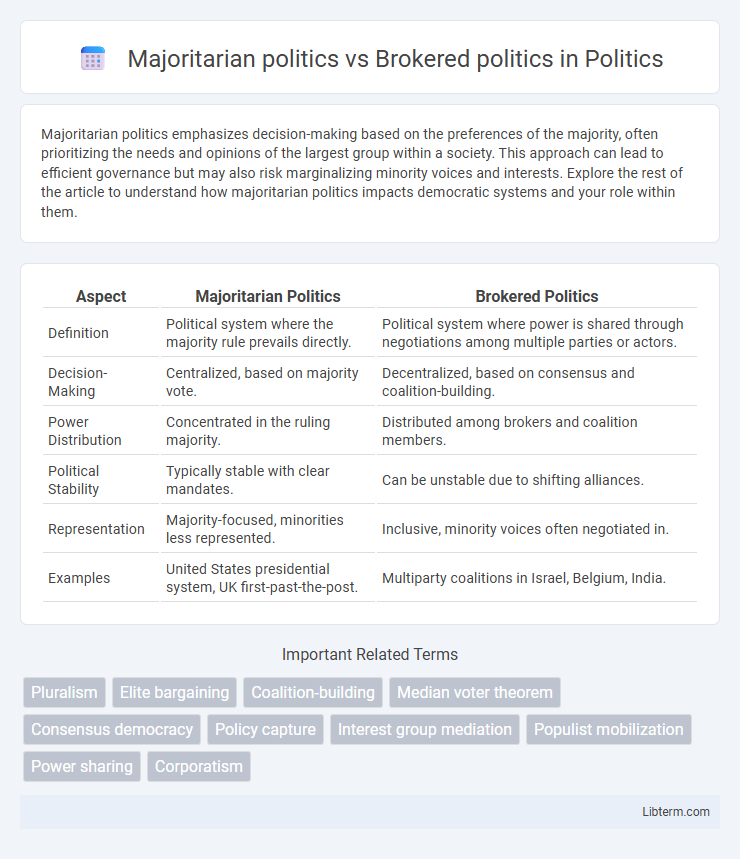Majoritarian politics emphasizes decision-making based on the preferences of the majority, often prioritizing the needs and opinions of the largest group within a society. This approach can lead to efficient governance but may also risk marginalizing minority voices and interests. Explore the rest of the article to understand how majoritarian politics impacts democratic systems and your role within them.
Table of Comparison
| Aspect | Majoritarian Politics | Brokered Politics |
|---|---|---|
| Definition | Political system where the majority rule prevails directly. | Political system where power is shared through negotiations among multiple parties or actors. |
| Decision-Making | Centralized, based on majority vote. | Decentralized, based on consensus and coalition-building. |
| Power Distribution | Concentrated in the ruling majority. | Distributed among brokers and coalition members. |
| Political Stability | Typically stable with clear mandates. | Can be unstable due to shifting alliances. |
| Representation | Majority-focused, minorities less represented. | Inclusive, minority voices often negotiated in. |
| Examples | United States presidential system, UK first-past-the-post. | Multiparty coalitions in Israel, Belgium, India. |
Understanding Majoritarian Politics
Majoritarian politics centers on the principle that the majority's preferences should govern decision-making, often resulting in a winner-takes-all system where the largest group imposes its will. This approach emphasizes clear mandates, strong government stability, and direct accountability to the electorate, often marginalizing minority opinions. Understanding majoritarian politics involves recognizing its impact on policymaking dynamics, electoral systems, and social cohesion, especially in diverse societies.
Defining Brokered Politics
Brokered politics involves multiple political parties or factions negotiating and forming coalitions to achieve governance, often resulting in power-sharing agreements. Unlike majoritarian politics where a single party secures a clear majority to control decision-making, brokered politics requires continuous compromise and consensus-building among diverse stakeholders. This system emphasizes negotiation and coalition-building, influencing legislative outcomes and policy stability in multiparty democracies.
Historical Roots of Both Systems
Majoritarian politics traces its historical roots to ancient Athens, where direct citizen participation shaped governance through majority rule, emphasizing a unified public will. Brokered politics originated in early modern Europe, evolving from decentralized feudal systems that necessitated negotiation and compromise among diverse power holders to maintain stability. These contrasting origins highlight the development of governance structures either centered on majority dominance or on continuous bargaining among political actors.
Key Characteristics of Majoritarian Governance
Majoritarian governance is characterized by the concentration of power in the hands of a single majority party, enabling decisive and unified policy-making aligned with the electorate's preferences. It typically features a strong executive branch, minimal reliance on coalitions, and clear accountability mechanisms, which streamline legislative processes and foster political stability. This governance model often contrasts with brokered politics, where power is distributed across multiple parties, requiring negotiation and compromise to form effective coalitions.
Core Features of Brokered Politics
Brokered politics revolves around negotiation and alliance-building among multiple parties or factions to achieve policy decisions or governance, contrasting with majoritarian politics where a single majority rules. Key features include coalition formation, power-sharing agreements, and compromise to balance diverse interests, often involving backroom deals and strategic bargaining. This approach fosters inclusivity and prevents dominance by a single group, ensuring representation of varied political perspectives.
Advantages of Majoritarian Politics
Majoritarian politics streamlines decision-making by concentrating power within a single party or coalition, enabling swift policy implementation and clear accountability. This system often results in political stability, reducing the likelihood of gridlock and fostering consistent governance. Voters benefit from straightforward electoral choices, as majoritarian frameworks typically produce clear winners with decisive mandates.
Strengths of Brokered Political Approaches
Brokered political approaches excel in fostering consensus by accommodating diverse interests and facilitating compromise among multiple stakeholders. This system enhances political stability by preventing domination of a single majority, promoting inclusivity and minority representation. By enabling negotiation and coalition-building, brokered politics often result in policies that reflect a broader spectrum of societal needs.
Criticisms and Challenges of Each System
Majoritarian politics often face criticism for marginalizing minority groups and simplifying complex policy issues into binary choices, which can lead to polarization and reduced political diversity. Brokered politics encounter challenges related to inefficiency and instability, as coalition-building requires constant negotiation and compromises that may dilute policy effectiveness. Both systems struggle with accountability; majoritarian models may overlook minority interests, while brokered systems can obscure responsibility due to fragmented power-sharing arrangements.
Global Examples: Majoritarian vs Brokered Models
Majoritarian politics often dominate in countries like the United Kingdom and India, where electoral systems favor a single party gaining a clear majority to form government, ensuring decisiveness and stability. In contrast, brokered politics is prevalent in nations like Belgium and Israel, characterized by coalition governments that require negotiation and compromise among multiple parties to establish power-sharing arrangements. These models illustrate how electoral systems and political cultures influence governance, with majoritarian systems prioritizing clear mandates and brokered systems emphasizing consensus-building.
The Future of Political Decision-Making Systems
Majoritarian politics centers on the dominance of a single political party or coalition that holds the majority, simplifying decision-making but risking marginalization of minority voices. Brokered politics involves negotiation and alliance-building among multiple parties or factions, promoting inclusivity and compromise but potentially leading to slower, more complex governance processes. The future of political decision-making systems may increasingly blend these models, leveraging digital platforms and data analytics to balance efficient majority rule with broad-based consensus-building in diverse societies.
Majoritarian politics Infographic

 libterm.com
libterm.com